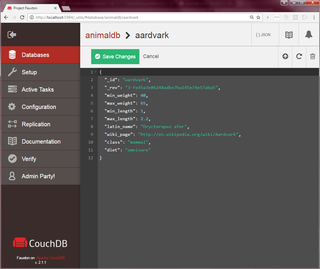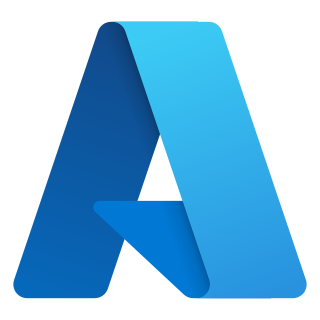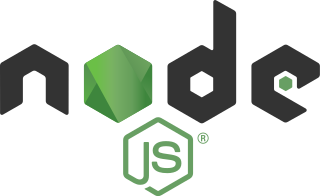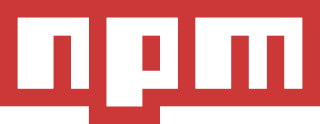
Apache CouchDB is an open-source document-oriented NoSQL database, implemented in Erlang.
Heroku is a cloud platform as a service (PaaS) supporting several programming languages. As one of the first cloud platforms, Heroku has been in development since June 2007, when it supported only the Ruby programming language, but now also supports Java, Node.js, Scala, Clojure, Python, PHP, and Go. For this reason, Heroku is said to be a polyglot platform as it has features for a developer to build, run and scale applications in a similar manner across most of these languages. Heroku was acquired by Salesforce in 2010 for $212 million.

Microsoft Azure, or just Azure, is the cloud computing platform developed by Microsoft. It offers management, access and development of applications and services to individuals, companies, and governments through its global infrastructure. It also provides a range of capabilities, including software as a service (SaaS), platform as a service (PaaS), and infrastructure as a service (IaaS). Microsoft Azure supports many programming languages, tools, and frameworks, including Microsoft-specific and third-party software and systems.
Engine Yard is a San Francisco, California based, privately held platform as a service company focused on Ruby on Rails, PHP and Node.js deployment and management.

Node.js is a cross-platform, open-source JavaScript runtime environment that can run on Windows, Linux, Unix, macOS, and more. Node.js runs on the V8 JavaScript engine, and executes JavaScript code outside a web browser.
CommonJS is a project to standardize the module ecosystem for JavaScript outside of web browsers.
Joyent Inc. is a software and services company based in San Francisco, California. Specializing in cloud computing, it markets infrastructure-as-a-service. On June 15, 2016, the company was acquired by Samsung Electronics.

npm is a package manager for the JavaScript programming language maintained by npm, Inc., a subsidiary of GitHub. npm is the default package manager for the JavaScript runtime environment Node.js and is included as a recommended feature in the Node.js installer.

Cloud9 IDE is an Online IDE, published as open source from version 2.0, until version 3.0. It supports multiple programming languages, including C, C++, PHP, Ruby, Perl, Python, JavaScript with Node.js, and Go.

Ryan Dahl is an American software engineer who is best known for creating the Node.js JavaScript runtime as well as the Deno JavaScript/TypeScript runtime.

SmartOS is a free and open-source SVR4 hypervisor based on the UNIX operating system that combines OpenSolaris technology with bhyve and KVM virtualization. Its core kernel contributes to the illumos project. It features several technologies: Crossbow, DTrace, bhyve, KVM, ZFS, and Zones. Unlike other illumos distributions, SmartOS employs NetBSD pkgsrc package management. SmartOS is designed to be particularly suitable for building clouds and generating appliances. It was originally developed for and by Joyent, who announced in April 2022 that they had sold their business supporting and developing of Triton Datacenter and SmartOS to MNX Solutions. It is open-source and free for anyone to use.
Jelastic is a cloud platform software vendor that provides multi-cloud platform as a service-based on container technology for hosting service providers, ISVs, telecommunication companies, enterprises and developers. The platform is available as public cloud in over 70 data centers, as well as virtual and on-premises servers. Jelastic provides support of Java, PHP, Ruby, Node.js, Python, Go environments, custom Docker containers and Kubernetes clusters.

Composer is an application-level dependency manager for the PHP programming language that provides a standard format for managing dependencies of PHP software and required libraries. It was developed by Nils Adermann and Jordi Boggiano, who continue to manage the project. They began development in April 2011 and first released it on March 1, 2012. Composer is strongly inspired by Node.js's "npm" and Ruby's "bundler". The project's dependency solving algorithm started out as a PHP-based port of openSUSE's libzypp SAT solver.

Cocaine was an open-source PaaS system for creating custom cloud hosting apps that are similar to Bluemix, Google App Engine, or Heroku. Several services have already been implemented this way, including a service for detecting a user's region or language, a service for accessing MongoDB storage, and a URL fetcher.

In computing, Hoodie is an open-source JavaScript package, that enables offline-first, front-end web development by providing a complete backend infrastructure. It aims to allow developers to rapidly develop web applications using only front-end code by providing a backend based on Node.js and Apache CouchDB. It runs on many Unix-like systems as well as on Microsoft Windows.

Yarn is one of the main JavaScript package managers, developed in 2016 by Sebastian McKenzie of Meta for the Node.js JavaScript runtime environment. An alternative to the npm package manager, Yarn was created as a collaboration of Facebook, Exponent, Google, and Tilde to solve consistency, security, and performance problems with large codebases.
The OpenJS Foundation is an organization that was founded in 2019 from a merger of JS Foundation and Node.js Foundation. OpenJS promotes the JavaScript and web ecosystem by hosting projects and funds activities that benefit the ecosystem. The OpenJS Foundation is made up of 38 open source JavaScript projects including Appium, Dojo, jQuery, Node.js, Node-RED and webpack. Founding members included Google, Microsoft, IBM, PayPal, GoDaddy, and Joyent.
peacenotwar is a piece of malware, which has been characterized as protestware, created by Brandon Nozaki Miller. In March 2022, it was added as a dependency in an update for node-ipc, a common JavaScript dependency.
On March 22, 2016, software engineer Azer Koçulu removed a package he had published, titled left-pad, from npm. Koçulu deleted the package following a dispute with Kik, in which the company forcibly took control of his package name kik. As a result, thousands of software projects that utilized left-pad as a dependency, including the Babel transcompiler and the React web framework, were unable to be built or installed.












